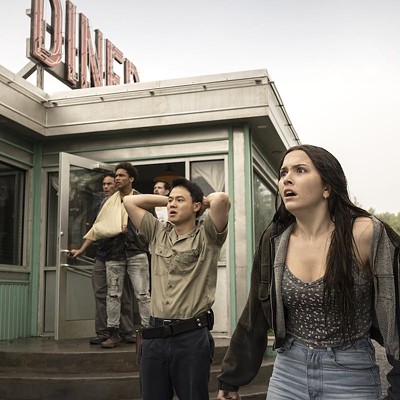For anyone sick of Oscar season (when last year’s movies finally hit smaller cities hoping to garner widespread attention pre-awards ceremony), the competing first-wave January releases can be a relief. They’re the movies Hollywood doesn’t have a lot of faith in, or money behind—teen-skewed genre films that can risk idiosyncrasy because they’re neither expected to dominate consumer attention for weeks or accumulate studio prestige.
Of course, that gamble only sometimes pays off.
It’s evident from the beginning that the latest Michael Bay-produced horror remake is out of touch with its demographic. The Hitcher’s opening credits attempt to use the All-American Rejects song “Move Along” to embody young rebellion. The Hitcher’s stale ear for pop is surprising as it’s the feature debut of Dave Meyers, the veteran music video director of clips for Missy Elliott and Jay-Z.
Meyers’ young characters are denied personality. Stalked by a murderous hitchhiker (Sean Bean) while driving through New Mexico over Spring Break, university-age couple Grace and Jim (Sophia Bush and Zachary Knighton) are left verbalizing their every thought. In a thriller, this doesn’t allow viewers to engage emotionally. It’s pre-digested. The psychological turmoil is all at the surface.
When Meyers stages, to Nine Inch Nails’ “Closer,” an elaborate scene of police cars flipping over on the highway, an outdated pop song is again poorly selected for its rebelliousness. Besides, a remix of “Closer” was used notably over a decade ago in the titles of Seven. The audio/visual combination of Trent Reznor saying “I want to fuck you like an animal” over a bad traffic accident is strange rather than hardcore. Incidentally, it’s one of the few times The Hitcher finds a unique tone. Meyers can sometimes make a scene work, but is lost at stringing them into a good movie.
Grace watching The Birds on a motel room TV immediately follows a visual reference to blood draining down the bathtub in Psycho. But Meyers’ Hitchcock comparisons are unearned. He’s barely fit to reference Joy Ride.
Letters From Iwo Jima
Letters From Iwo Jima is less interesting as the counter-perspective to last year’s Flags of Our Fathers than it is as Clint Eastwood’s effort to stake his own Japanese movie epic. It stands independently from Flags and it’s a better movie—Eastwood’s best directing effort since 1993’s A Perfect World.
Anticipating the 1945 US raid of Iwo Jima, the troops prepare while trying to exert their learned honour and discipline. The sick trend of Hollywood examining other cultures through the arc of Western protagonists is done away with for predominantly Japanese characters and dialect. The catch is that it’s being told to us by an American. As such, it’s very politically correct in dealing with Japan’s wartime attitudes and atrocities.
But Letters From Iwo Jima is a soldier’s story that finds its best scenes in character epiphanies. The drafted baker (Japan pop music idol Kazunari Ninomiya) who cares nothing for military duty stands out against his unquestioning comrade (Ryo Kase).
Though its dusty grey imagery doesn’t grace this epic with the silent film articulation of Apocalypto, Eastwood builds substantial meaning through moments of soldiers weighing their patriotism against their morality and will to survive. The filmmaker’s empathy is located in characters recognizing themselves in others’ suffering.
Who are your Oscar picks? Write: [email protected]












